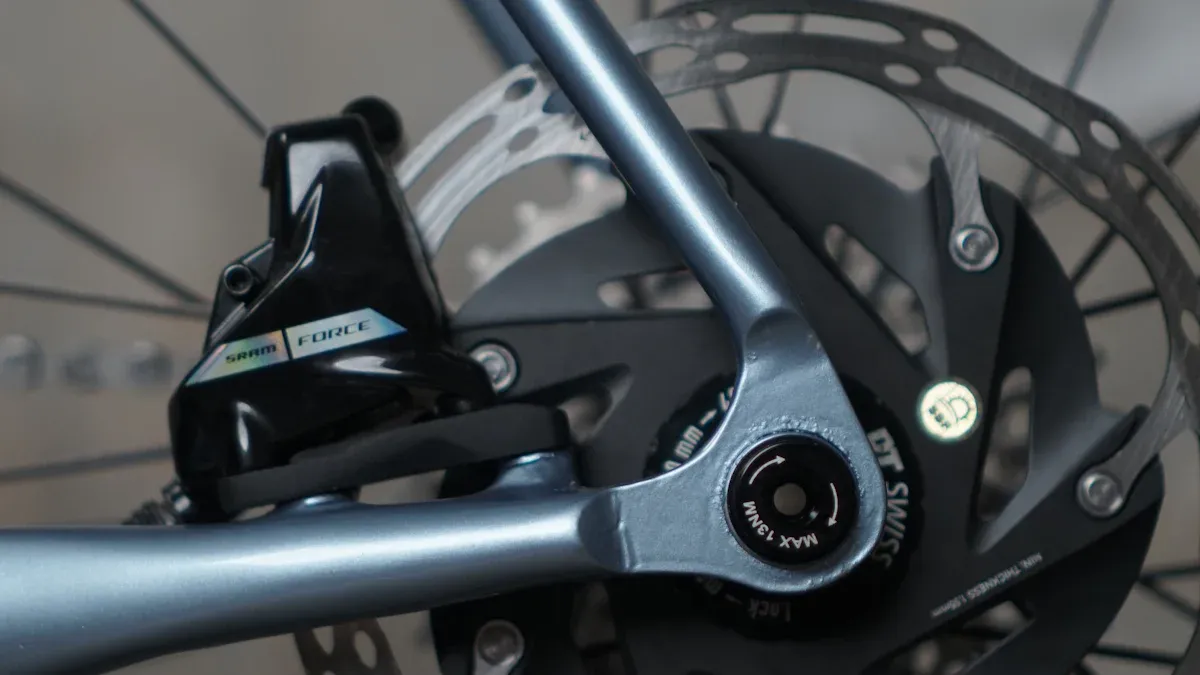
When you choose a bike, the frame material is crucial. Titanium bike frames are exceptional due to their unique features, including their impressive titanium bike frame weight. They boast a great strength-to-weight ratio, making them ideal for serious cyclists. Titanium can withstand crashes and impacts that could damage other materials. This toughness is essential for mountain bikers and those seeking high performance. Additionally, titanium can absorb vibrations, providing a smoother ride and enhancing comfort on long trips.
Key Takeaways
Titanium bike frames are strong and light. This makes them perfect for serious cyclists who want durability and good performance.
The weight of a titanium frame helps with speed and climbing. This means faster reactions and easier climbs up hills.
Titanium frames do a good job of absorbing bumps. This gives you a smoother and more comfortable ride, especially on long trips.
Unlike steel and aluminum, titanium frames do not rust. They need very little care, which helps them last longer and work well.
Buying a titanium bike frame can make your cycling better. It mixes performance, comfort, and durability.
Titanium Frame Weight Overview

When you think about a titanium bike frame, its weight is important. The titanium bike frame weight affects how you ride. Usually, a good titanium frame weighs about 1.5 kg. For instance, the Moots Vamoots RSL 56cm titanium frame is under 1200g. Even though titanium frames are light, they can be heavier than top carbon frames, which can be under 1000g.
Many things can change the weight of titanium frames. Here are some important points to think about:
Feature | Description |
|---|---|
Gives you strong but light frames. | |
Corrosion Resistance | Makes sure they last in different weather. |
Natural Damping Properties | Soaks up road bumps for a smoother ride. |
Longevity | Titanium frames stay strong over time. |
Biocompatibility | Safe for riders because they are non-toxic and hypoallergenic. |
Alloy Type | Grade 9 (Ti-3Al-2.5V) is strong and light. |
Design Features | The size of the tubes and their thickness change weight and stiffness. |
The design of your titanium frame also affects its weight. Thinner tubes can make it lighter, while thicker tubes can make it stiffer. You should think about these things when picking a titanium frame. In the end, knowing the titanium frame weight helps you choose the right bike frame for your needs.
Weight Comparison

When you look at titanium bike frames, aluminum and steel are different. You will see big differences in weight and how they perform. Knowing these differences can help you choose the right bike.
Titanium vs. Aluminum
Aluminum frames are usually lighter than titanium ones. Aluminum bike frames weigh about 1.2 to 1.8 kg (2.6 to 4 lbs). On the other hand, titanium frames weigh between 1.5 to 2.3 kg (3.3 to 5 lbs). Even though titanium is heavier than aluminum, it is stronger. This means less material is needed to build it. So, titanium may weigh more, but it is more durable and performs better.
Fatigue Resistance: Titanium lasts longer than aluminum. It can handle more stress before problems happen. This makes it a good choice for long-term use.
Strength vs. Weight: Titanium might be about two-thirds heavier than aluminum. However, its strength makes it worth using where durability and high load capacity matter.
Titanium vs. Steel
When you compare titanium to steel, titanium frames are usually lighter. For similar frames, the titanium one will weigh less. Steel bike frames weigh between 1.36 to 2.04 kg (3 to 4.5 lbs).
Ultimate Tensile Strength: Titanium has a high ultimate tensile strength (UTS) for its weight. This means you can have a strong frame without making it heavy.
Ride Comfort: Titanium gives a comfortable ride on bumpy roads. It absorbs vibrations better than aluminum and steel. This makes for a smoother ride. This is especially helpful for long-distance cyclists. It helps reduce tiredness and allows for longer rides with more comfort.
Impact on Speed
Acceleration Benefits
When you ride a bike, the frame’s weight is very important. A lighter bike helps you speed up quickly. This is especially true when you start from a stop or need to go fast for a short time. With titanium frames, you get a good stiffness-to-weight ratio. This means you have a strong frame that isn’t too heavy.
Reduced Weight: A lighter bike helps you perform better, especially on hills.
Power Efficiency: A heavier bike needs more power to keep going fast. You have to work harder to push against the bike’s weight, which can slow you down.
Wheel Inertia: The weight of the wheels also affects how fast you can speed up. A heavier bike needs more force to reach the same speed as a lighter one.
In short, titanium’s light weight helps you accelerate better. This lets you react quickly to changes in the road or speed.
Climbing Efficiency
Climbing steep hills can be tough, but your bike’s weight really matters. On hills that are steeper than 8%, a lighter bike can help you climb faster. This is because of a better power-to-weight ratio. For example, if you make your bike 500 grams lighter, you can save about 5 watts of power on a 10% hill. This change can give you a big time advantage when climbing.
Power-to-Weight Ratio: A high power-to-weight ratio is key for climbing well. The lighter your bike, the less effort you need to climb easily.
Titanium’s Strength: Titanium frames are strong enough for climbing bikes while keeping the weight low. This mix helps you climb steep hills with confidence.
Comfort and Ride Quality
Vibration Absorption
When you ride a bike, comfort is important. Titanium frames are great at absorbing vibrations. They have a natural ‘springiness’ that makes your ride feel lively and quick. This helps lessen the bumps from rough roads. Here are some key points about how titanium absorbs vibrations:
Titanium has great vertical compliance. This means it absorbs road vibrations well.
Riders often say titanium frames feel more lively than carbon frames, which can feel flat or ‘dead.’
Tests show that while titanium might not absorb vibrations better than aluminum, it needs less effort to move. This means you can ride longer with less work.
On fast gravel roads, titanium frames feel almost as comfortable as carbon frames. Both materials can give similar comfort when you use the right parts. This shows that the differences in vibration absorption may not be as big as some think.
Long-Distance Comfort
Long rides can be tough, but titanium frames are very comfortable for endurance cyclists. Many riders say that riding a titanium bike feels like riding a steel bike, which is known for comfort. Here are some thoughts from riders:
One rider said that tire size and pressure really affect ride comfort. This shows that things other than frame material can change your experience.
Another rider pointed out that frame design is very important. Some materials are stiffer, which can change how comfortable your ride is over long distances.
Overall, titanium frames give a smooth and enjoyable ride, making them a great choice for long-distance cycling. You can enjoy the ride without worrying about being uncomfortable.
Durability of Titanium
Corrosion Resistance
When you think about a bike frame, corrosion resistance is very important. Titanium is special because it is very durable in this way. Unlike steel and aluminum, titanium does not rust. This means you can ride in different weather without worrying about the frame getting damaged.
Titanium creates a protective layer when it touches air. This layer keeps the metal safe from rust. Because of this, your titanium bike frame stays strong and looks nice over time. Steel and aluminum frames often need special coatings to stop rust, which makes them harder to take care of.
You will see that titanium bike frames need very little care. Just cleaning them with a gentle bike wash is usually enough to keep them looking good. Even though titanium can handle tough conditions, you should check for dents and cracks now and then to make sure they last long.
Material | Durability | Stress Fatigue Life | Corrosion Resistance |
|---|---|---|---|
Titanium | High | Much higher | Resistant |
Scandium | Moderate | Decreased | More prone to corrosion |
Impact Resistance
Impact resistance is another important thing to think about when looking at bike frames. Titanium alloys are great at absorbing energy and resisting crashes. This quality is very important for performance during impacts. Studies show that how titanium works is affected by its tiny structure. The balance between the α and β phases changes how the material acts under stress.
While titanium frames are strong, they can fail more often than steel frames in high-impact situations. This is mostly because of material flaws. Steel frames are known for being reliable, making them safer in tough situations. However, many cyclists choose titanium because it is light and strong, which helps with performance.
In short, titanium bike frames give you a special mix of performance and strength. Here are some important points:
Advantages:
They are light and strong.
They don’t rust, which helps them last longer.
Disadvantages:
They cost more than other materials.
When you think about your next bike, keep in mind that titanium frames can make your rides better, especially on long trips and steep hills. As technology improves, more people will want titanium. It’s a great choice for cyclists who want both performance and comfort. 🚴♂️
FAQ
What are the benefits of a titanium bike frame?
Titanium frames are strong and light. They absorb vibrations well and resist rust. This makes them last longer and feel comfy on long rides or bumpy paths. You can enjoy a smooth ride without worrying about damaging the frame.
How does titanium compare to carbon frames?
Titanium frames are usually heavier than carbon ones. However, they are much stronger and resist impacts better. With titanium, you get a longer lifespan and less need for repairs. Carbon frames might be lighter, but they can break more easily.
Are titanium bike frames worth the investment?
Yes, titanium frames are a good investment for serious cyclists. They mix performance, comfort, and long-lasting use. Even though they cost more at first, their strength and low upkeep can save you money later.
How do I maintain my titanium bike frame?
Taking care of your titanium frame is easy. Clean it often with a gentle bike wash. Check for dents or cracks from time to time. Unlike other materials, titanium doesn’t rust, so you won’t need special coatings or treatments.
Can I customize my titanium bike frame?
Yes! Many companies let you customize titanium frames. You can pick tube shapes, sizes, and colors. Customizing helps you create a bike that fits your riding style and preferences just right.
See Also
Why Titanium Bike Frames Stand Out From Others
Evaluating Aluminum Bike Frame Durability: Benefits and Drawbacks
Comparing Enduro Bike Frame Materials for Durability and Strength
Differences Between Triathlon and Time Trial Bike Frames
Understanding the Strength and Weight of Magnesium Bike Frames
